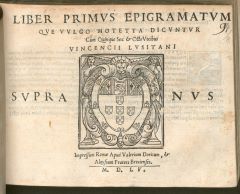Vicente Lusitano in RISM
Thursday, April 11, 2024

An article last year in Early Music America entitled “Vicente Lusitano – A Legacy Recovered” by Garrett Schumann reminded us of how important it is to ensure that musical sources of underrepresented composers are more visible in the digital environment. Vicente Lusitano (ca. 1522-after 1561) was a Portuguese composer and music theorist who was of African descent.
Prompted by Schumann’s article, we took another look at how well the works of Vicente Lusitano are represented in RISM. As a result, we enhanced some records and added a few new ones.
As a composer, Lusitano is principally known for his collection of motets, published as Liber primus epigramatum (Rome, 1551). The 23 motets are now listed in a contents note in the RISM record (RISM ID no. 990038714 - RISM Catalog | RISM Online). The only known copy, at the Bayerische Staatsbibliothek, has been digitized (see image).
The anthology Il primo libro delle muse (Venice, 1562) includes Lusitano’s madrigal “All’hor ch’ignuda d’herb’et fior la terra.” Full contents notes for the entire book are now available, and digital copies are available for the Basso partbook kept in Berlin and all three partbooks preserved in Krakow (RISM ID no. 1000000576 - RISM Catalog | RISM Online).
In addition to this published output, we can point to the motet “Beati omnes qui timent Dominum,” which is preserved in a 1562 manuscript of motets and other sacred songs, held in the Württembergische Landesbibliothek in Stuttgart (D-Sl Cod. mus. I fol. 3; not yet in RISM).
Vicente Lusitano also wrote music treatises. His Introduttione facilissima was published in three editions starting in 1553. This treatise was included in RISM’s B/VI volume, Écrits imprimés concernant la musique (1971) and they are all new to the RISM database. Digital copies are available for all editions. The editions are:
-
1st edition: Rome, 1553. RISM ID no. 1001262127 - RISM Catalog | RISM Online
-
2nd edition: Venice, 1558. RISM ID no. 1001262143 - RISM Catalog | RISM Online
-
3rd edition: Venice, 1561. RISM ID no. 1001262151 - RISM Catalog | RISM Online
According to Fétis (and repeated in Eitner and others), the Introduttione facilissima was translated into Portuguese by Bernardo da Fonseca and published in Lisbon in 1603 (Biographie universelle, vol. 10, p. 379). However, we weren’t able to locate a copy of this translation, and upon consulting with our RISM Portugal working group, it seems the publication was a misunderstanding on Fétis’s part.
In fact, the confusion was cleared up by Ernesto Vieira back in 1900: “The work that Vicente Lusitano had printed […] had two more editions, both done in Venice, one in the year 1558 and another in 1561. Barbosa de Machado says it was translated into Portuguese by the priest Bernardo da Fonseca in 1602, whose manuscript was given to the precentor of Évora, Manuel Severim de Faria; however, it remained unpublished, despite Fétis, misinterpreting Machado’s words, affirming that it was published.” (Diccionario Biographico de Musicos Portuguezes. Lisboa: Lambertini, 1900. Vol. 2, p. 47.)
Lastly, Lusitano’s Tratado de canto de organo is now in RISM (RISM ID no. 1001262952 - RISM Catalog | RISM Online). This is an anonymous manuscript music treatise preserved in Paris. Robert Stevenson suggested Lusitano as an author in 1962. Samuel J. Brannon’s 2016 dissertation supports this authorship claim and goes even further, suggesting that this Tratado served as a draft for the Introduttione facilissima.
Having more complete contents notes, enhanced records, and digitized items ensures that musicians and scholars worldwide have access to primary sources needed for performance or research. In 2020 we wrote about finding music by musicians from racial or ethnic groups that are underrepresented in today’s concert programs.
Some of our RISM contributors are currently engaged in projects to ensure that underrepresented composers are findable in RISM. At the IAML Congress in Cambridge, we heard about the “Power of Indigenous Song” project at Harvard Library and an initiative at the Library of Congress to report manuscripts by Black composers to RISM.
Below, enjoy Vicente Lusitano’s motet “Emendemus in melius” performed by Arte Mínima. More about their project The Secret Music of Vicente Lusitano can be found here.
Image: Title page of Vicente Lusitano, Liber primus epigramatum (Rome, 1551). Bayerische Staatsbibliothek (D-Mbs 4 Mus.pr. 94#Beibd.8). RISM ID no. 990038714 - RISM Catalog | RISM Online. The book includes the motet “Emendemus in melius.” Available online, CC BY-NC-SA 4.0
Share Tweet EmailCategory: New at RISM

